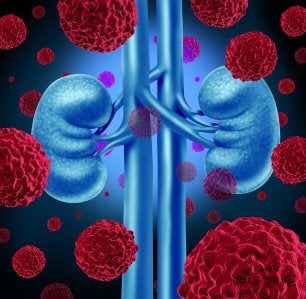Exploring Kidney Cancer Risk Factors
 Kidney cancer accounts for approximately 3% of all adult cancers in the United States. This number may seem insignificant on its own, but when you consider that it translates to approximately 32,000 new cancer cases annually the number doesn’t seem so small. Kidney cancer claims about 12,000 lives each year, most of whom are men between the ages of 50 and 70. Although we don’t yet know what causes kidney cancer, we do recognize that certain risk factors are linked to an elevated risk for developing the disease. If you can positively identify any of these kidney cancer risk factors, schedule a screening with a urologist in Nashville .
Kidney cancer accounts for approximately 3% of all adult cancers in the United States. This number may seem insignificant on its own, but when you consider that it translates to approximately 32,000 new cancer cases annually the number doesn’t seem so small. Kidney cancer claims about 12,000 lives each year, most of whom are men between the ages of 50 and 70. Although we don’t yet know what causes kidney cancer, we do recognize that certain risk factors are linked to an elevated risk for developing the disease. If you can positively identify any of these kidney cancer risk factors, schedule a screening with a urologist in Nashville .
Unhealthy Lifestyle Habits
Certain lifestyle habits that might be considered unhealthy have shown a causal link with kidney cancer. Smoking, for example, increases the risk of getting kidney cancer. People who are overweight and have a poor diet are also at a higher risk of getting kidney cancer . You might also be at risk if you are regularly exposed to certain chemicals that increase the risk for kidney cancer, including cadmium, herbicides, and certain organic solvents.
Inherited Conditions
Kidney cancer can sometimes be caused by one of six rare inherited conditions. Although people who have these conditions account for only a small portion of total kidney cancer patients overall, people who have these conditions have a much higher risk for developing kidney cancer compared to others. These inherited conditions are:
- Birt-Hogg-Dube syndrome
- Family renal cancer
- Hereditary papillary renal cell carcinoma
- Hereditary leiomyoma-renal cell carcinoma
- Hereditary renal oncocytoma
- Von Hippel-Lindau disease
Certain Medications
Phenacetin, a once popular pain-reliever, has been linked to kidney cancer but has not been prescribed in the United States for over 20 years. Today there are certain drugs used to treat high blood pressure that have been linked to an elevated risk of kidney cancer, though it’s not clear whether the link is related to the medication or the high blood pressure. Ask your doctor if any of the medication you are on has been shown to elevate one’s risk for kidney cancer.
If you are worried that you might be at risk for kidney cancer, visit Urology Associates P.C. for a cancer screening. We are the leader in urological care in Nashville and throughout Tennessee. If you are diagnosed with kidney cancer, we provide the most advanced and aggressive kidney cancer treatment to help you recover. Call us toll-free at (888) 329-7700 to find a urologist in your area.
Recent Posts
categories
- Uncategorized
- Bladder Cancer
- Women's Sexual Health
- MonaLisa Touch
- Urology
- Urologist
- Erectile Dysfunction
- Kidney Cancer
- Incontinence
- Prostate
- MonaLisa Touch Laser Treatment
- Kidney Stones
- Urinary Tract Infections
- Event
- Sexual Dysfunction
- Testicular Cancer
- Prostate Cancer
- Urology Surgery Center
- urinary incontinence
- vaginismus
- noncoital pain disorder
- Hypoactive Sexual Desire Disorder
- Infographic
- provenge
- Xofigo
- robotic surgery
- hormone replacement
- diabetes
- renal cell carcinoma
- pelvic pain
- hematuria
- sexual health
- chronic testicular pain
- premature ejaculation
- Men's Health Clinic
- Dr. Melvin Seard
- Interstitial Cystitis
- vasectomy
- overactive bladder
- vaginal atrophy
- nocturia
- bladder infections
- urethral strictures
- Acute Epididymitis
- low sex drive
- circumcision
- pelvic floor dysfunction
- Peyronie's Disease
- prostatitis
- female sexual dysfunction
- varicocele
- difficult urination
- low libido
- PSA levels
- male fertility
- penile prosthesis
- prostatic intraepithelial neoplasia
- male infertility
- estrogen levels
- nurse navigator
- stress urinary incontinence
- vaginal yeast infection
- elevated psa
- painful sex
- adult circumcision
- epididymitis
- OAB
- kidney infection
- penile cancer
- pelvic organ prolapse
- Vasectomy Reversal
- bone health
- cystectomies
- clinical trials
- bloody urine
- Advanced Therapeutic Center
- WISH MedSpa
- neurogenic bladder
- WISH Team
- prostate biopsies
- BPH
- fecal incontinence
- lithotripsy
- osteoporosis
- kidney cysts
